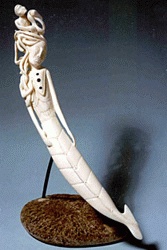"Alaska Quarterly Review is one of the
nation's best literary magazines."
-- THE WASHINGTON POST BOOK WORLD
"Highly recommended and deserves applause."
-- THE LIBRARY JOURNAL
Alaska Quarterly Review (AQR), now in its 20th year of continuous publication, is UAA's internationally acclaimed literary journal. Its award-winning selections are regularly featured in the nation's most prestigious collections.
 |
| 'Seeking Her Forgiveness' by Alaska Native artist Susie Silook |
 |
AQR recently published a special volume entitled Alaska Native Writers, Storytellers & Orators: The Expanded Edition. U.S. Senator Frank Murkowski noted that "This particular volume is especially important in that it recognizes Native writers and furthers Native culture … I can think of few more worthy goals."
Funded in part by a Heritage and Preservation Grant from the National Endowment for the Arts, the volume conveys a sense of richness and diversity of Alaska Native culture and heritage -- a national treasure. The book is also about cultural survival.
"My aunts are dying off on me and alone I'll be living … " These haunting words come from the "Lament for Eyak," a story-poem sung by Anna Nelson Harry and recorded on tape by Michael E. Krauss, a University of Alaska linguist in Yakutat Alaska in 1972. The Eyak people she mourns -- her family -- once lived in the territory between present-day Cordova and Yakutat. In 1880, before the arrival of the first American canneries and trading posts, they numbered around 200. Within the next 20 years, their culture was overwhelmed by the non-Natives who came to work the canneries. The newcomers brought alcohol and deadly diseases and interfered with subsistence practice, and by 1900 the two principal Eyak villages had been destroyed. A few Eyak lingered in Old Town Cordova, but their story was drawing to a close. By 1933 the Eyak population was down to 30, only 15 of whom spoke the native language. In 1952, when the first linguist arrived, only seven native speakers remained. Today, there is just one.
 |
| Editor Ronald Spatz, center, accepts an award. |
 |
"Lament for Eyak" is one of the poems, oral histories, folk tales and stories featured in a section of the book devoted to the oral traditions and traditional texts from fifteen original Native languages. Contemporary Alaska Native works (written in English) are also featured, along with a contexts section that provides cultural and historical background about selected works.
"The impulse to tell stories is universal to the human condition," says Editor Ronald Spatz, "and language is the lens through which we convey who we are. These primary texts emphasize the distinctiveness of Alaska Native people and their respective literary traditions and heritages." With the publication of this edition of AQR, UAA provides a venue for Native voices from our statewide community to share their stories and their insights and their ways of life. Together these voices create a living record of culture and heritage.




